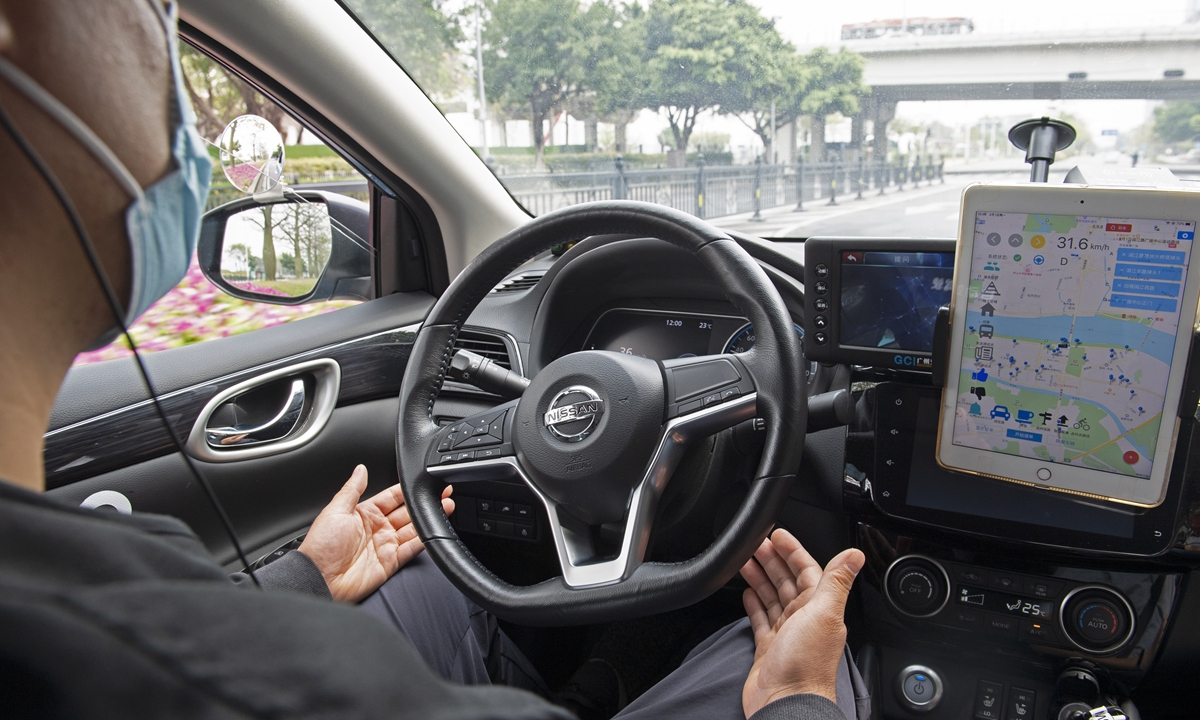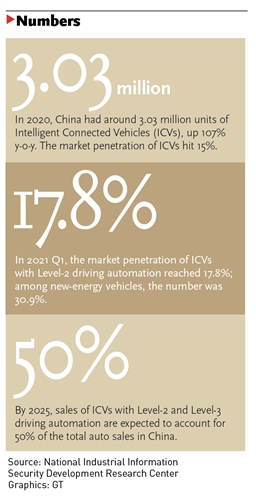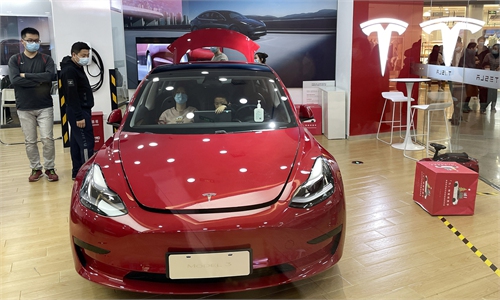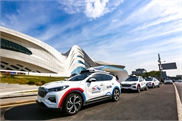More efforts are called for management of smart driving: analysts
Legislation on autopilot called for to ensure safety: experts

A man sits in an autonomous driving vehicle on a pilot road in Guangzhou, South China's Guangdong Province on March 1. The city is promoting the development of intelligent connected vehicles and smart city construction. Photo: cnsphoto
Sitting in the driver's seat with breakfast in one hand while the other on the steering wheel, driving at 70-80 kilometers per hour along Beijing's Fourth Ring Road, has become a new habit for Jia, a 30-year-old white-collar worker. The move of putting one hand on the steering wheel is to let the bulky machine know that the driver is still in charge instead of totally letting go.
"The function freed my other hand so that I can do something else like eating my breakfast, which is my favorite part since I could really feel the benefit created by technological advances," Jia told the Global Times. He owns a Tesla Model 3 vehicle.
While enjoying this state of the art, Jia is clearly aware of the difference between driver assistance functions - which is not something fresh and has been equipped on intelligently connected cars - and the often-talked self-driving functions, which has yet to become technologically mature to navigate real world settings. .
"I am cautious when using the autopilot feature. I need to be on alert if any car could cut in front of mine or the vehicle could not recognize a road poster in advance. In a word, you are still the driver not it," he added.
Self-driving era
Tesla's Autopilot system belongs to the Level 2 (Partial Driving Automation) among the six levels of driving automation ranging from Level 0 (fully manual) to Level 5 (fully autonomous) as defined by the Society of Automotive Engineers (SAE) and adopted by the US Department of Transportation.
Zhu Xichan, the head of the institute of automotive safety technology at Tongji University, told the Global Times that it will take three to five years in China to reach to the next level - Level 3, which is conditional driving automation, a substantial jump from the current Level 2.
Smart new-energy vehicles (NEVs) have become more accepted by Chinese consumers amid the country's push for green mobility over recent years, leading to burgeoning NEV sales of both homegrown and foreign brands like Tesla.
The trio of top Chinese NEV makers - Nio, Xpeng and Li Auto - have each achieved monthly delivery of 8,000 units. Despite Tesla sales in the Chinese market tumbling 69 percent to hit 8,621 vehicles last month, from 28,138 in June, the figure in August and September is expected to grow and may set a new monthly record of 30,000 units, observers said.
However, a slew of events related with the intelligent green mobility have sparked concerns over the security for vast quantities of data generated by the new type of cars, as well as their assistance driving functions.
On Saturday, an official WeChat account called "Meiyihao" published an obituary for its founder, Lin Wenqin, saying that he died on August 12 in a car accident. The release noted that Lin's vehicle, a Nio ES8, had its "Navigate on Pilot" (NOP) functioning at the time of the accident.
The accident is still under investigation. As of press time, the local traffic control department and Nio have not disclosed additional information.
Industry insiders told the Global Times Sunday that it's still unclear whether the accident was directly related with the assisting driving feature. If it is, the driver bears responsibility.
Nio released its NOP feature in October 2020, which combines onboard navigation, HD maps, and Nio Pilot to automatically guide the vehicle to follow the navigation route in certain conditions, according to its official website.
Nio underscores in its user manual that "like Pilot and other driver assistance functions, NOP cannot respond to static obstacles, such as roadblocks, warning triangles, etc. If there is an accident or construction area ahead, please immediately take over the vehicle to control the direction and speed."

'Smart' regulation
More efforts are needed to strengthen the safety management of products combined with driving assistance functions and automated driving functions to ensure the safe operation of smart vehicles, according to new regulations announced on Wednesday by the Ministry of Industry and Information Technology (MIIT).
Connected vehicle makers that provide automated driving assistance and other autopilot capabilities should take technical measures such as hands-off detection to ensure that drivers are always performing necessary dynamic driving tasks.
The carmakers also must clearly inform users about their vehicles' functions, performance limitations, driver responsibilities, human-computer interaction equipment instructions and function activation and exit methods, according to the MIIT guidelines.
"It's a timely document following recent flare-ups of accidents related with smart mobility, and its requirements are just key to the point in terms of road safety issue," Feng Shiming, an auto analyst with Shanghai-based Menutor Consulting, told the Global Times Sunday.
Feng noted that further effort is needed around the assisting driving system since it has become more popular among new car buyers.
"Education or training for buyers prior to car delivery is necessary to let them know that they should be ready to take over the car any time; Facial recognition technology inside cars should also be considered to open when the driver starts the pilot system to make sure he or she is really watching the road ahead," Feng suggested, adding that crucial data tracking is also important when accidents occur.
Alongside the assistance measure's safety, the MIIT guidelines also required improved management of data security for intelligent connected vehicles, highlighting that personal information and important data collected and generated during operations within the territory of China shall be stored in the country. If the data needs to be provided overseas, it must go through a data exit security assessment.
An auto industry insider, who asked to remain anonymous, told the Global Times that the guidelines will be gradually implemented throughout industry regulations, which could even become the national mandatory technical standards.
"The rollout was like providing an early warning to connected carmakers to make them get prepared technically, and they will have a smooth transitory period," he noted.
In March, China's Ministry of Public Security solicited public input relating to new regulations on self-driving vehicles for its latest road safety law. The proposed amendments clarified the requirements related to road testing of, and access by, vehicles equipped with automated driving feature, as well as regulating how liabilities for traffic violations and accidents will be allocated.


